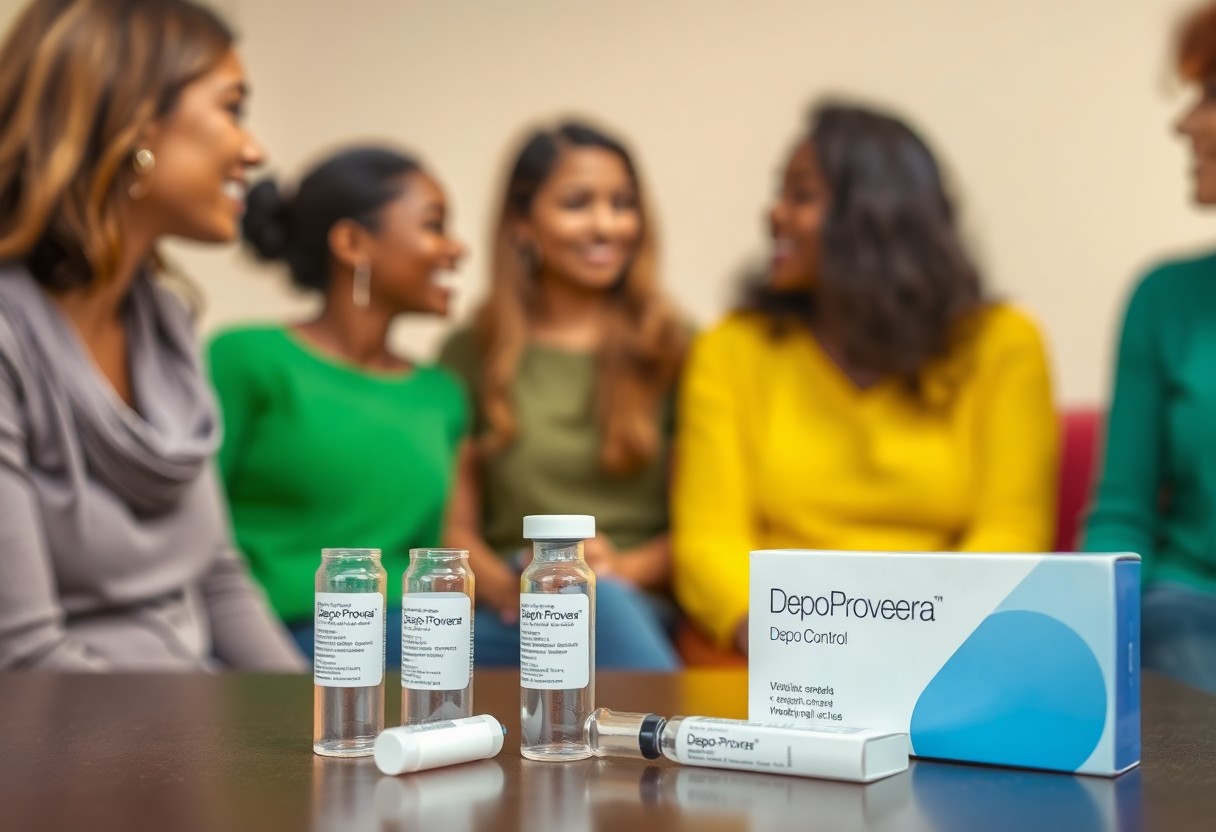You need to be informed about the potential link between Depo-Provera and brain tumors. Understanding the implications of this contraceptive option can empower you to make educated choices regarding your health. This post will guide you through raising awareness about this important issue, touching on symptoms, risk factors, and the significance of open conversations with your healthcare provider. By sharing information and resources, you can contribute to the overall understanding and caution surrounding these potential risks in your community.
Understanding Depo-Provera
Before considering any medication, it’s necessary to fully understand its implications and uses. Depo-Provera is a contraceptive injection that provides a long-term solution for those seeking to prevent pregnancy. This chapter aims to educate you on its functions, benefits, and potential side effects, fostering a well-rounded awareness.
What is Depo-Provera?
You may know Depo-Provera as a birth control method, delivered via an injection every three months. This hormone-based contraceptive contains medroxyprogesterone acetate, which works by preventing ovulation, thickening cervical mucus, and thinning the uterine lining, enhancing its effectiveness in pregnancy prevention.
Common Uses and Side Effects
Understanding the uses and side effects of Depo-Provera can help you make informed decisions regarding your reproductive health. Commonly prescribed for those who prefer a convenient, long-lasting contraceptive method, some individuals may experience side effects.
A variety of common uses for Depo-Provera include managing heavy menstrual bleeding and reducing pain associated with endometriosis. However, some users may experience negative side effects such as weight gain, mood changes, and potential impacts on bone density. While most individuals tolerate it well, serious side effects like blood clots or changes in vision warrant immediate medical consultation. Balancing benefits with risks is vital in determining if this contraceptive is right for you.
The Link Between Depo-Provera and Brain Tumors
Some recent discussions have surfaced regarding the potential link between Depo-Provera, a popular contraceptive method, and brain tumors. Although current medical consensus suggests that there is insufficient evidence to establish a definitive connection, ongoing research aims to further investigate these concerns. It’s important for you to be informed about these discussions, as they could impact your decisions relating to reproductive health.
Current Research Findings
With numerous studies underway, researchers are exploring the possible associations between Depo-Provera and various types of brain tumors. Preliminary findings indicate that while some women report health issues, the data remains inconclusive. It is vital for you to stay updated on emerging research in order to make informed choices regarding your health.
Factors Contributing to Risk
An overview of factors that may contribute to the risk associated with Depo-Provera usage includes:
- Genetic predisposition: Family history may play a role.
- Age: Younger women using the product might be impacted differently.
- Duration of use: Long-term usage has raised additional concerns.
Thou should evaluate these factors diligently in the context of your personal and family medical history.
Another important consideration in assessing risk involves how these factors interact with your overall health profile. Individual lifestyle choices and existing medical conditions could also affect your susceptibility. You may also want to consider other hormonal contraceptives and their potential risks:
- Underlying conditions: Certain health issues could elevate risk.
- Weight factors: Obesity has been linked to higher risks in several studies.
- Medications: Some drugs may influence hormonal levels and brain health.
Thou should engage in proactive discussions with your healthcare provider to thoroughly understand all relevant factors that may affect your decision-making process.
How to Raise Awareness
Now is the time to address the potential link between Depo-Provera and brain tumors by raising awareness in your community. You can initiate conversations, distribute informative materials, and utilize social media to share personal stories and research findings. Encouraging open discussions will help create an informed network that can advocate for further research and patient safety.
Educating the Community
Now that you understand the importance of awareness, focus on educating your community about the potential risks associated with Depo-Provera. Host workshops, collaborate with healthcare providers, and create informational brochures. The more informed individuals are, the better equipped they will be to make decisions regarding their health.
Engaging in Advocacy
Raise your voice by engaging in advocacy efforts that highlight the need for increased research and safety measures surrounding Depo-Provera. You can participate in campaigns, join forces with local health organizations, and connect with lawmakers to promote policies that protect patient health. Use your skills to share compelling data and personal anecdotes that resonate with others.
Advocacy is about actively pushing for awareness and change regarding Depo-Provera and its potential connection to brain tumors. You can participate in organized events, reach out to decision-makers, and leverage social media platforms to amplify your message. With your efforts, you can drive home the point that greater research is needed to understand the implications of this medication, ensuring that safety takes precedence in healthcare decisions. Your voice can help catalyze change and support patients who may face this troubling diagnosis.
Tips for Patients and Families
Unlike many treatments, the Depo-Provera injection can present different challenges. Here are some tips for you and your family to stay informed and proactive:
- Educate yourself about potential side effects
- Maintain open communication with your healthcare provider
- Keep a symptom diary to track any changes
- Join support groups for shared experiences and advice
Knowing these strategies can empower you in navigating health decisions related to brain tumors and Depo-Provera.
Recognizing Symptoms
An awareness of the symptoms associated with brain tumors is key. Look for changes such as persistent headaches, unexplained nausea, memory loss, or vision changes. Early identification can lead to quicker intervention, so stay observant of your health and any unusual signs.
Seeking Medical Guidance
The importance of consulting with a healthcare professional cannot be overstated. If you experience concerning symptoms, don’t hesitate to seek medical evaluation. Your healthcare provider can offer tailored advice and may recommend tests to rule out serious conditions or ensure timely diagnosis.
This proactive approach to seeking medical guidance greatly enhances your chances of addressing any potential issues early. If you notice severe symptoms like sudden vision changes or persistent headaches, it’s imperative to contact your provider immediately. Prompt action can lead to early detection of brain tumors, which often results in more favorable outcomes. Always trust your instincts when it comes to your health.
Supporting Ongoing Research
Many people are unaware of the significant need for continued research into the connections between Depo-Provera and brain tumors. This ongoing study is vital not only for understanding potential risks associated with this contraceptive but also for discovering effective treatment options and preventative measures. By supporting research, you contribute to a broader awareness in the medical community, which can lead to better health outcomes for women everywhere.
Importance of Research Funding
Clearly, adequate funding is vital for advancing research initiatives focused on the long-term effects of Depo-Provera. Without financial support, studies may be limited in scope and ultimately hinder our understanding of potential risks. Increased funding allows researchers to conduct comprehensive studies and provides the resources necessary to explore innovative approaches in both prevention and treatment.
How to Get Involved
Research contributions can come in various forms, advancing the dialogue on health concerns. You can volunteer for clinical trials or participate in surveys about your experiences. Furthermore, you might consider donating to organizations that focus on research in women’s health. Spreading the word about the risks associated with Depo-Provera helps gather more support for ongoing studies.
Involved with research initiatives provides you with an opportunity to create real change in the field of women’s health. By sharing your experiences or engaging with local organizations, you raise awareness and advocate for further studies. Look for community health events or online platforms where you can connect with others who share your concerns. Contributing to conversations around Depo-Provera and its potential risks can significantly impact future research and help ensure that women’s health issues are taken seriously.

Resources for Further Information
For those seeking to understand the connection between Depo-Provera and brain tumors, a variety of resources are available to provide you with necessary insights. Medical journals, health websites, and patient advocacy organizations are reliable sources that can help you stay informed about current research and safety concerns. Utilizing these resources ensures that you are well-equipped with the latest information to make conscious health decisions.
Recommended Organizations
For comprehensive support and information, you can turn to organizations like the American Brain Tumor Association and the National Cancer Institute. These organizations offer valuable resources, including research findings and treatment options, to help you better understand the risks and implications of any health-related decisions.
Educational Materials
Information is abundant regarding the relationship between Depo-Provera and brain tumors, and numerous educational materials are generated to help you navigate this complex subject. Fact sheets, research articles, and patient guides are often produced by health organizations and can present you with a balanced view of potential risks versus benefits.
Another effective way to deepen your knowledge is by exploring infographics, downloadable resources, and webinars provided by health professionals. These educational materials not only simplify the science behind Depo-Provera but also highlight significant symptoms and timelines for monitoring your health. Engaging with these resources empowers you to make informed decisions while raising awareness within your community about the potential risks of this contraceptive method.
To wrap up
As a reminder, raising awareness about the potential links between Depo-Provera and brain tumors is vital for your health and the well-being of others. By educating yourself and sharing reliable information, you can empower those around you to make informed choices regarding their reproductive health. Engage in discussions, support research initiatives, and advocate for transparent clinical studies to foster a better understanding of these issues. Your efforts can contribute significantly to a more informed community and can lead to improved health outcomes for many.
















